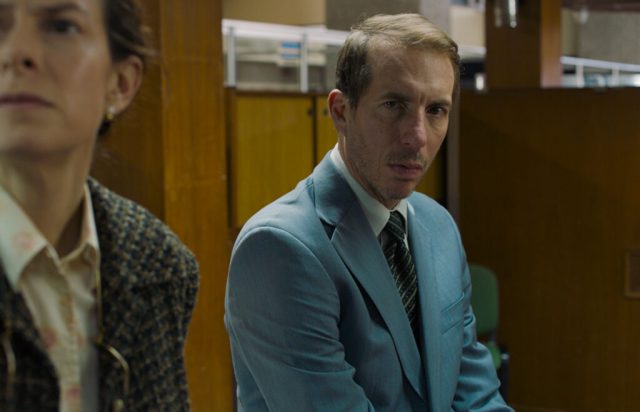
Final Rating: 3.5/5
For anyone who has worked a nine to five, we’ve all had that thought. That moment of realization that weighs upon us and makes one question their position, not just of employment, but in life. When you work at a bank, it’s fraught with even more temptation knowing a lifetime of freedom lingers at your fingertips. This is essentially the premise of the argument that Morán (Daniel Elías), a bank employee in Buenos Aires puts forth in The Delinquents, Argentina’s official entry into the 2024 Oscars for Best International Film, directed by Rodrigo Moreno. The tedium of life draining his spirit, he calculates how much he would need to steal to live out the rest of life.
After taking the money, he confides in Román (Esteban Bigliardi), a fellow employee and brings him in on the deal, having him watch the money while he serves his prison sentence (as he plans to turn himself in) in exchange for half. This is in part because Román asked to leave the office that day to have a neck brace removed, which afforded Morán the opportunity to take the money. Morán uses this as leverage, in essence saying he’ll frame it as though Román planned to leave as he was in on the robbery, but also as he’s been a trustworthy employee he wouldn’t be suspected. I won’t go so far as to say this notion is flimsy, as there is merit to his argument, but certainly if Román wanted to get out of this arrangement he could’ve, and he ultimately must live with his choice.

The movie itself is lengthy (at three hours) yet some moments or decisions are rushed through, like Román’s girlfriend’s decision to leave him, while others could be more fleshed out. For instance, to start, we see a glimpse of Morán’s life at the bank, enough to understand the basic principle of its repetitive nature. Then it relies more often on his dialogue to let us know why he’s chosen to enact this plan, in a reversal of the ‘show don’t tell’ screenwriting mantra.
As he tells Román early on, he longs for a simple life away from the city and isn’t greedy. Stealing what he would earn the rest of his career at the bank, basically in exchange for serving a six year sentence, reduced to three and a half with good behaviour. After which, he’s free to live as he wants without the tedium of his current one. Román stashes the money, agreeing to split it, and Morán is sent to jail, eagerly waiting for the day when his plan comes to fruition. We then follow Román, meandering from one social interaction to another, focusing on characters rather than present a complex scheme fraught with peril, or backstabbing.

There are some intense moments, when he has to conceal the money, or when the bank brings in Morna (Cecilia Rainero), an investigator to try and find who Morán may have corroborated with. This leads to several layoffs and staff issues as they can’t admit that there was a robbery, lest customers lose faith in the bank. So they simply make life more miserable for their employees in the hopes of one of them confessing. Román holds his ground, and even fights the temptation to spend the money. But he knows he must get it out of his house, so Morán informs him of a spot to hide it in a remote area.
There’s also a gritty scene in the prison when Morán is threatened by the resident ‘God’, and must pay him protection money to survive. These moments show the complications of the situation, but are eschewed rather quickly for quieter moments and scenic shots. These include Román meeting a group filming in said remote area where he’s gone to hide the money, and he soon strikes up a romance with one of the women.

Without spoiling too much, the interpersonal stories come full circle at the end and the focus of the relationships is made clearer and leads to a decision that must be made by Román that will affect both him and Morán. This is a pivotal moment that again, is brushed aside without much fan-fair or drama given the nature of it. Morán, who has spent much of his time reading, is released and sets about his new life, literally riding off into the sunset.
The film raises some intriguing questions about, mostly with regards to how we regard work and ultimately what value we place on our own time and life outside it. The scenery is wonderful and the cast deliver solid performances. It’s not by any means a tight narrative, but ultimately paints the picture of one man who wants a different life and another who must decide what it is he’s after.



